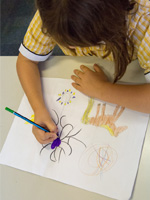Supporting Your Child
Parent Role
Home tasks are an opportunity for children to learn the skills of time management and the value of solving problems on their own. At times, home tasks can strain parent/child relationships, we hope this information is helpful for you and your child.
The School expects students to invest considerable thoroughness of effort in their home tasks and parents are asked to:
- check that work recorded in the diary and/or Canvas is completed;
- write a note in your child's diary or email the class/subject teacher if the required work is not completed within the set time;
- ensure that your child understands what the set work is about;
- encourage high standards of thoroughness and care in the completion of their work;
- support your child but avoid doing the work for them.
Support Strategies
Establish a Working Environment
- A quiet area free from distraction (with the TV off).
- Adequate lighting.
- An uncluttered work space.
- Comfortable seating.
- Easy access to necessary materials — books, stationery, computer or iPad.
- Ensure your child is supervised at all times when using the computer or iPad.
- Monitor time — allow breaks as necessary.
Establish Attitudes and Expectations
Discuss school activities and reading together on a daily basis.
Reading at Home
Reading to and with your child is good modelling; it helps you to connect with what the student is reading and facilitates discussion. Additionally, providing opportunities for your child to read by themselves gives them independence. Don't forget to check-in on their reading by asking, ‘What's happening in your book?’ or ‘What do you think will happen next?’
Avoid Conflict
- Establish an agreed time allocation for each day of the week.
- Construct a weekly planner with your child that allows for a balance between study activities and non-study activities e.g. music, sporting activities, TV.
Utilise Canvas
Use Canvas with your child to check on the details and progress of their home tasks.
Manage Difficulties
If your child experiences difficulties assist by:
- acknowledging what they know about the task and topic already;
- talking over difficulties with them;
- suggesting ways to solve the problem;
- supporting and encouraging their efforts;
- breaking down the problem into simpler terms.
NB: If your child experiences problems regarding quantity, level of difficulty or expectations, do not hesitate to contact the teacher and arrange a time to discuss your concerns.
Nurture an Independent Learner
Parental support is essential but participation depends on the needs of the student. It is important to encourage your child to become a responsible and independent learner. As internationally recognised scholar, Professor Erica McWilliam from Queensland University of Technology says,
'… parents who do their child’s homework for them are stealing from them. You are taking away the opportunity for your child to learn from their mistakes.'
|

